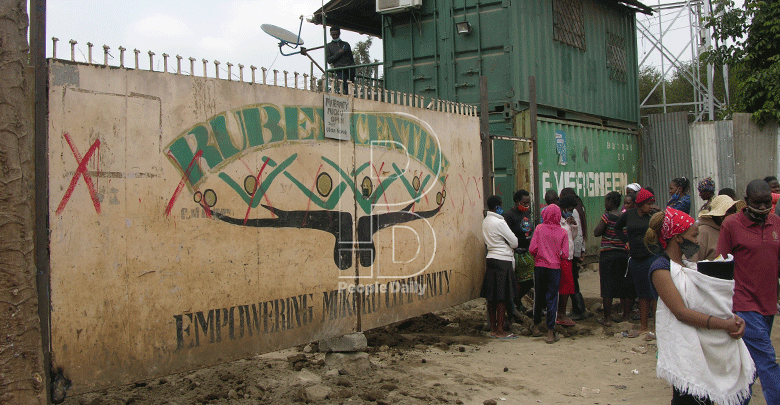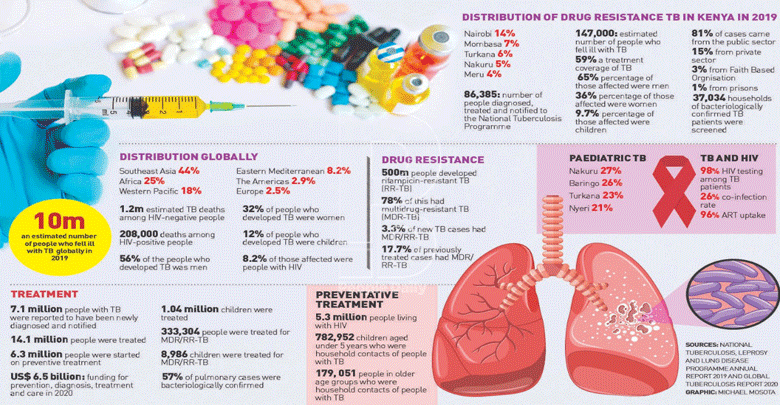Missing numbers: Why TB patients must continue treatment
By Clifford Akumu, March 22, 2021There was so much Collins Onzere was looking forward to when he began his first job in the sprawling Mukuru Kwa Rueben slum as a hairdresser. To him, starting a career in hair, beauty and make-up, exploring the bustling city, and finally living independently thereafter was his motivation.
But his wish, for now, is on hold.
As we settle down for a chat at the Ruben Health Centre, the desperate screams of a child whose temperature is being recorded by a nurse in the next room echo off the walls. In the room we are with Onzere, there is little activity; focus on the covid-19 has disrupted detection and treatment of other infectious diseases such as tuberculosis (TB).
Onzere is being treated for ordinary TB, an infectious disease caused by bacteria that primarily affects the lungs.
It can also affect other parts of the body, including the brain, spine and kidneys.
The airborne disease spreads easily in cramped living conditions, and is often associated with poverty.
“Until my diagnosis, I was an extremely focused person, hoping to stand out and achieve my goals.
I felt nothing could stop me. But now I feel that everything is slipping away,” Onzere begins.
He is now responding to treatment and getting stronger-according to healthcare workers looking after him.
Tuberculosis, the biggest infectious-disease killer worldwide claims 1.5 million lives each year.
Kenya is among countries with the highest TB burden in the world with a prevalence rate of 291 cases per 100,000 people.
Approximately, 90 people die of TB in the country every day. And this has greatly been attributed to the high poverty levels in the country estimated at 45.2 per cent through poor nutrition, overcrowding, alcohol and substance abuse and poor access to health care services.
In October 2019, Onzere started feeling an unusual pain in his body. Onzere, now 27, developed a persistent fever followed by bouts of heavy coughing and rapid weight loss. The pain persisted.
Beauty salon
He would visit several pharmacies within the slum for medication. When over the counter medicines did not help, he was advised by his boss at the beauty salon to seek medical attention.
“My boss feared I would scare away customers as my condition deteriorated. I used to cough a lot,” Onzere explains. “I decided to visit Ruben Health Centre to find out.
I was tested and told to get a chest X-ray at Mama Lucy Hospital. After examining the results, the doctors told me I had TB.”
TB spreads from person to person through coughing, sneezing, even speaking-so long as it can release microscopic droplets into the air. In most cases, it is curable, but it can prove dangerous without proper treatment.
But the treatment and care proved to be painstakingly challenging. For example, the more resistant TB is, the more complicated the treatment combination and the longer the treatment lasts. Onzere was immediately put on treatment and care at the facility.
“I was crying all the time because the medication I had to take was just too much. It was depressing.
I hated taking my tablets; they were so big. So, I used to skip them. I lost weight, developed rashes on my skin and got frustrated,” recalls Onzere.
Onzere gets an additional Sh3,000 tri-monthly stipend he uses to buy foodstuff.
People with TB who skip medication are likely to get sicker in the short term. And in the long-term, there is even more worrying consequence: a rise in drug-resistant forms of the lung disease.
According to the WHO, at least 121 countries have reported a drop in TB patients visiting clinics since the pandemic began, threatening hard-fought gains.
Even though Onzere is slowly recovering, his boss is still jittery of recalling him back to work.
Onzere has no choice, but to depend entirely on his parents for upkeep and siblings for household chores.
Covid-19 link
“It has changed my life. I’m still coming to terms that I can no longer fend for myself, even wash my own clothes, now I have to depend on other people.
It is ridiculously unusual that I live like a king because of this condition. My work literally is to bathe, eat a balance diet, and take my drugs,” he explains.
Luckily, his boss has continued to support him in his recovery journey, even offering foodstuff.
Until recently, TB and its deadly allies, HIV and malaria, were on the run. Significant progress had been made towards tackling the lung disease.
The Covid-19 pandemic, especially considering mitigation measures in place, has proven to be a major setback in achieving targets-as TB case detection has dramatically fallen, treatment have often been delayed and the risk of interruption of treatment and potential increase of people with drug-resistant TB has increased.
According to TB Global Report 2020’s modelling analyses on the potential impact of the Covid-19 pandemic on global TB deaths, the annual number could rise to the levels seen in 2015 or even 2012.
People who have TB are usually more vulnerable to other infections, including the novel coronavirus, due to pre-existing lung damage. They are at a higher risk of developing complications from the pandemic.
Medics now warn that disruption of TB services could spell disaster for hundreds of thousands at risk.

Dr Lorraine Mugambi Nyaboga, chief of party TB Accelerated Response and Care II (TB ARC) project notes that just like Covid-19, TB is transmitted through droplets and presents in a similar manner.
Dr Mugambi adds that because of stigma many patients are quite scared of being diagnosed with Covid-19.
“So many patients might have TB symptoms such as cough, fever, weight loss, but will not present to the facility.
We are now seeing a reduction of number of patients coming to our facilities. Even as we are thinking about Covid-19 pandemic, we also need to think about TB as well,” she sayss.
Even those initially diagnosed with TB are not coming for follow-up sessions. Number of TB cases being diagnosed across the country has also declined between five to 15 per cent.
Millicent Kamau, a clinician at the Ruben Health Centre clinic notes that before the pandemic, the clinic used to see up to 600 presumptive TB cases in each quarter, and would get 15 cases in a month.
“But currently, we hardly get eight cases,” she notes.
“The danger we are looking at is that, we are having a lot of TB cases in the community, but because of fear and stigma associated with somebody coughing, we are not getting the numbers we previously used to get.
There is a chance we have a lot of TB cases and people are not getting treated. The numbers could be higher because TB can be transmitted from one person to the other,” she adds.
Since the advent of the pandemic, the facility has had three cases of drug resistant TB compared to drug-sensitive, which they support with treatment and nutritional support.
Keeping silent
Kamau explains that medically, ordinary TB cannot move to drug resistant TB, but there has to be factors behind it.
“Either you have been exposed to TB drugs before, or you get a primary infection of the drug resistant TB,” she says.
Overcrowding in slums is likely to blame for the spread of TB, with the facility recording a lot of cases in young adults.
“This is because they tend to stick together in drinking and mirra dens and working environment, where most of them work in the overcrowded industries,” she explains.
At Bahati Multi Drug Resistance (MDR) Clinic in Nairobi’s Eastlands area we meet Amina Abdala, 38-lying in a barren hospital bed as a nurse administers one of two daily antibiotic injections into her forearm. She has been visiting the facility for her drugs after she was diagnosed with the condition.
Amina was staying in Kakuma before moving to Nairobi last year.
“I started feeling unwell while in Kakuma. I used to cough a lot. And in the process, lost many customers in my small kiosk.
I visited many health facilities at the refugee camp, but I was only told I had a throat problem,” she says through a translator.
She would later move to Nairobi to join other relatives and seek treatment as the pain persisted.
It was in the city, where she was diagnosed with Multi-drug resistance TB (MDR-TB). She is now on care and treatment.
“Because of stigma, I decided not to tell anybody about my condition,” she recalls. But later she opened up and has since received support from her family.
Alex Wanjohi, clinical officer at Bahati MDR-TB clinic explains there are two types of TB, the pulmonary and extra-pulmonary TB. For drug susceptible TB the treatment takes six months while drug-resistance TB takes 18 months.
“At Bahati, the numbers are not looking good either. We used to record about 60 patients in a month seeking TB services; today, we are getting only 20 patients. But in the recent past we are starting to see a gradual increase in numbers,” he say.
Onzere and Amina have had challenges adopting to pandemic protocols.
“It was difficult to put on a mask every day. At some point, I got terrified when I heard somebody who had come for treatment at the facility from nearby Mukuru Kwa Njenga slum contracted Covid-19 virus,” explains Onzere.
Kamau explains the pandemic has impacted a great deal on cough hygiene and the use of facemasks has also translated to the low numbers as transmission from one person to the other is reduced.
